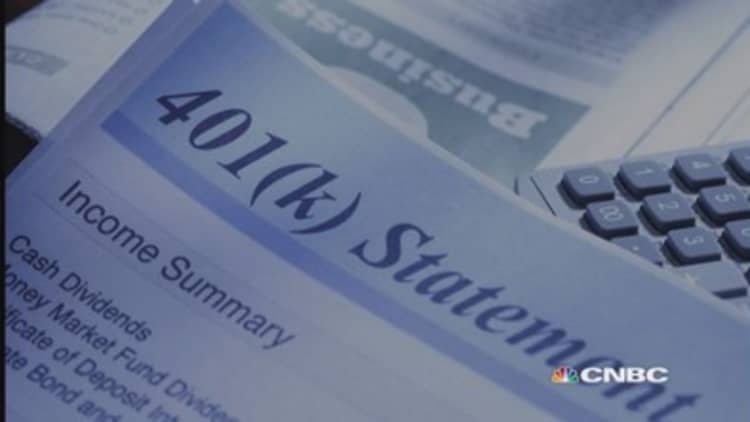Long before kids encounter financial literacy in school, they learn from the Bank of Mom and Dad—and those lessons (right or wrong) can really stick.
Last year, 28 percent of adults told the National Foundation for Credit Counseling that they primarily learned personal finance from their parents. Among kids currently ages 8 to 14, 65 percent say they learn more about money from their parents than they do at school, according to a T. Rowe Price survey released last month.
The difficulty? Although the T. Rowe Price survey found that 69 percent of parents are very or extremely concerned about setting a good financial example for their kids, 40 percent are relying on a "do as I say, not as I do" attitude for teaching their kids about money. Almost half don't have an emergency fund that would last three months or more, 28 percent carry over a credit card balance every month and 28 percent have taken money from their child's piggy bank.
Read MoreFinancial literacy: Not just a problem for students
To be fair, being a good financial role model isn't easy. "It takes effort," said Judith Ward, a senior financial planner at T. Rowe Price. "It really does, and that's why a lot of parents may not be doing these things with their kids." Some mistakes, experts say, are those parents don't even realize they're making:
Shielding kids from money talk
"Probably the mistake parents make most is that they don't have conversations about money with their kids," said Laura Levine, president and chief executive of the Jump$tart Coalition for Personal Financial Literacy. They have plenty of reasons, from not wanting their kids to worry about financial matters, to thinking kids are too young to understand or that they might blab sensitive details. But in the absence of information, kids will draw their own conclusions based on what they overhear or see you do. "The message I have for parents is, it's not all or nothing," said Levine. Kids don't need to know your exact salary to get the message that the family's finances aren't precarious (often what they really want to know). Base the context on your child's age.



Helicopter parenting
Nearly 60 percent of parents told T. Rowe Price that they sometimes let their kids make bad financial decisions to learn from those mistakes. That's the right move. "I want children to skin their noses, if you will, under a parent's care financially," said certified financial planner Sheryl Garrett, founder of The Garrett Planning Network. "They will make mistakes when they get out in the real world." It's much better to learn the lesson of money poorly spent on a $15 toy than a bigger-ticket purchase as an adult, she said.
Using the same excuse for 'no'
Parents overuse "We can't afford that," which makes kids suspicious, said Ward. Two-thirds of kids in the T. Rowe price survey said their parents have told them they can't afford something when they really could. (Only 47 percent of parents copped to having done so.) Be specific. "Say, it would be great if we could go to Disney World every year, but these are the other things we're saving for," said Ward. That helps kids understand the ideas of limited resources and trade-offs; if we spend money on A, we won't have it for B. Giving honest answers can also impart smaller smart shopping lessons, said Garrett, who recently used her daughter's request for raspberries to talk about why tastier (and cheaper) in-season fruits were on their shopping list instead.
Read MoreMillennials: Just like their grandparents
Always paying with plastic
Pulling out a debit or credit card for every purchase means kids don't get to see you count or handle money, creating disconnect from the idea that there's a monetary unit behind that swipe, said Levine. "It's like kids who think that you go to the ATM and money just comes out," she said. "They don't know you had to put money in [the account]." That can put kids behind the curve when it comes to concepts like budgeting or saving. "They need to see that not everything is immediate gratification," said Chantel Bonneau, a wealth management advisor at Northwestern Mutual. Talk about how that card ties in—that money comes out of your checking account, and in the case of bigger purchases, that you've planned and saved for that. Even better, "give them some exposure to cash," said Levine. That might be through having them help count out cash for your some of your own purchases, or letting them handle it themselves via an allowance.
Read More2015 college grads may have missed the hiring wave
Hiding spending
Telling your child to keep a purchase secret from your spouse can have several negative effects. The biggie, of course, is that it's OK to lie about spending and keep money secrets, said Garrett. It can also lead kids to draw negative conclusions about your money attitudes, she said—if mom wants to keep it secret that we went to the mall, dad must be the scrooge of the family. It's smarter to talk to kids about splurges and different spending priorities, said Ward; i.e., "This purchase is important to me." But don't put your kids in the position of secret-keeper unless the hidden purchase is say, your spouse's birthday gift.


